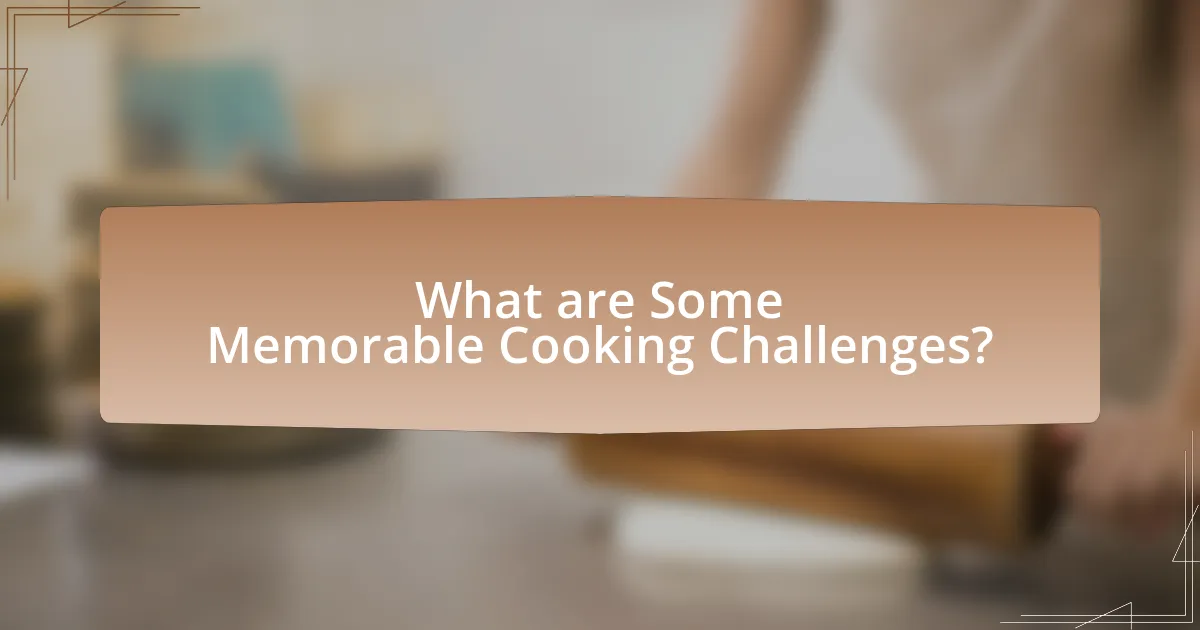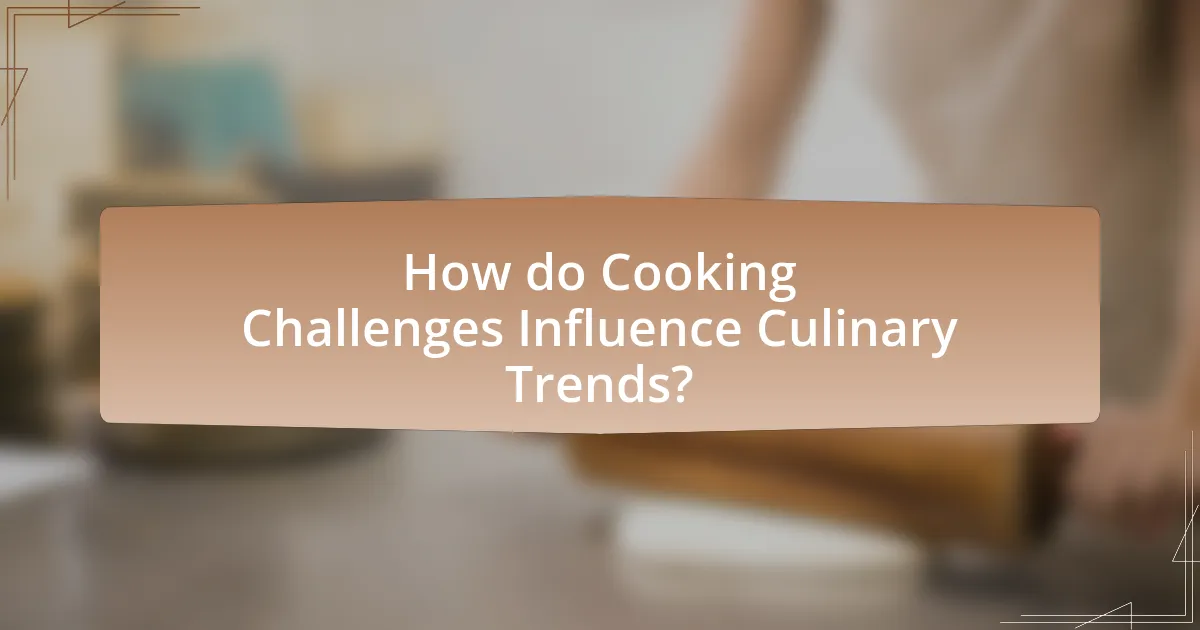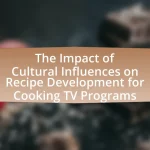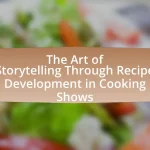The article focuses on iconic cooking challenges in television history, highlighting significant moments such as “MasterChef’s Mystery Box Challenge,” “Top Chef’s Restaurant Wars,” and “The Great British Bake Off’s Showstopper Challenge.” It explores the evolution of cooking competitions from simple home cooking contests to complex, high-stakes formats, detailing how these challenges resonate with audiences through emotional engagement and competitive dynamics. Additionally, the article examines the impact of cooking challenges on culinary trends, home cooking, and the skills they emphasize, while also addressing memorable and controversial moments that have shaped the genre.
![]()
What are Iconic Cooking Challenges in TV History?
Iconic cooking challenges in TV history include “MasterChef’s Mystery Box Challenge,” “Top Chef’s Restaurant Wars,” and “The Great British Bake Off’s Showstopper Challenge.” These challenges are significant as they test contestants’ creativity, skill, and ability to perform under pressure. For instance, the Mystery Box Challenge on “MasterChef” requires contestants to create a dish using a limited selection of ingredients, showcasing their culinary ingenuity. “Top Chef’s Restaurant Wars” involves teams creating a pop-up restaurant, emphasizing teamwork and execution in a high-stakes environment. The Showstopper Challenge on “The Great British Bake Off” demands elaborate baked creations, highlighting contestants’ artistic flair and technical prowess. Each of these challenges has become a defining moment in their respective series, contributing to the show’s popularity and viewer engagement.
How have cooking challenges evolved over the years?
Cooking challenges have evolved significantly over the years, transitioning from simple home cooking contests to complex, high-stakes competitions featured on television. Initially, cooking challenges focused on basic skills and family recipes, as seen in early shows like “The Galloping Gourmet” in the 1970s, which emphasized entertainment and accessibility. As the culinary landscape changed, shows like “Top Chef,” which premiered in 2006, introduced professional chefs competing under rigorous conditions, showcasing advanced techniques and creativity. This shift reflects a growing audience interest in gourmet cooking and the culinary arts, leading to the incorporation of diverse cuisines and innovative formats, such as elimination rounds and themed challenges. The evolution is further evidenced by the rise of social media platforms, where cooking challenges have expanded beyond television, allowing home cooks to participate in global trends like viral cooking challenges, thus democratizing the culinary competition space.
What were the earliest cooking challenges on television?
The earliest cooking challenges on television were featured in shows like “The French Chef,” which premiered in 1963, hosted by Julia Child. This program introduced viewers to the concept of cooking competitions by showcasing Child’s culinary skills and encouraging home cooks to try new recipes. Another early example is “The Great British Bake Off,” which began airing in 2010, although it followed earlier formats of cooking contests in various countries. These shows set the stage for the modern cooking competition genre, emphasizing skill, creativity, and the challenge of preparing dishes under time constraints.
How did the format of cooking challenges change in the 2000s?
In the 2000s, the format of cooking challenges evolved to emphasize competitive elimination and reality television elements. Shows like “Top Chef” and “MasterChef” introduced structured competitions where contestants faced off in timed challenges, often with a panel of judges critiquing their dishes. This shift created a more dramatic narrative, focusing on personal stories and rivalries among contestants, which increased viewer engagement. The incorporation of audience voting and interactive elements also became prevalent, allowing viewers to influence outcomes, further transforming the cooking challenge landscape.
Why do cooking challenges resonate with audiences?
Cooking challenges resonate with audiences because they combine entertainment, competition, and culinary creativity, engaging viewers emotionally and intellectually. The thrill of watching contestants face high-pressure situations, coupled with the relatability of cooking, creates a compelling narrative that captivates diverse demographics. Research indicates that reality competition shows, including cooking challenges, attract large audiences due to their ability to evoke suspense and foster viewer investment in contestants’ journeys, as evidenced by shows like “MasterChef,” which has garnered millions of viewers worldwide. This blend of excitement and relatability explains the widespread appeal of cooking challenges in television history.
What emotional elements do cooking challenges incorporate?
Cooking challenges incorporate emotional elements such as stress, excitement, and camaraderie. Participants often experience stress due to time constraints and high stakes, which can lead to heightened emotions and dramatic moments. Excitement arises from the competitive nature of the challenges, as contestants strive to impress judges and secure their place in the competition. Additionally, camaraderie develops among contestants, fostering friendships and alliances that can evoke feelings of support and empathy, especially during moments of vulnerability. These emotional dynamics contribute to the engaging narrative of cooking challenges, making them memorable for audiences.
How do cooking challenges create a sense of competition?
Cooking challenges create a sense of competition by pitting participants against each other in timed, skill-based tasks that require creativity and technical proficiency. The structured environment of these challenges, often featuring judges and elimination rounds, heightens the stakes and fosters rivalry among contestants. For example, shows like “MasterChef” and “Top Chef” utilize formats where chefs must impress judges with their culinary creations under pressure, leading to a competitive atmosphere that drives participants to perform at their best. This competitive dynamic is reinforced by audience engagement and the potential for rewards, such as cash prizes or career opportunities, further motivating contestants to excel.

What are Some Memorable Cooking Challenges?
Some memorable cooking challenges include the “Mystery Box Challenge” from MasterChef, where contestants create dishes from a selection of unknown ingredients, and the “Technical Challenge” from The Great British Bake Off, which tests bakers on their ability to follow a recipe with minimal guidance. These challenges are significant as they highlight contestants’ creativity and skill under pressure, often leading to dramatic and entertaining moments in culinary competitions. For instance, the Mystery Box Challenge has been a staple in various cooking shows since MasterChef’s inception in 1990, showcasing the unpredictability and excitement of cooking with limited resources.
Which cooking challenges have left a lasting impact?
The cooking challenges that have left a lasting impact include the “MasterChef” pressure tests, “Top Chef” elimination challenges, and “The Great British Bake Off” signature bakes. These challenges have significantly influenced culinary television by setting high standards for creativity, skill, and presentation. For instance, “MasterChef” introduced intense pressure tests that pushed contestants to their limits, showcasing their ability to perform under stress, which has become a hallmark of competitive cooking shows. Similarly, “Top Chef” has popularized the concept of quickfire challenges that test chefs’ adaptability and innovation, while “The Great British Bake Off” has emphasized the importance of traditional baking techniques and community spirit, resonating with audiences worldwide. These formats have shaped viewer expectations and inspired a new generation of chefs, solidifying their lasting impact on the culinary landscape.
What made the “MasterChef” pressure test iconic?
The “MasterChef” pressure test became iconic due to its intense format that challenges contestants to create complex dishes under strict time constraints. This high-stakes environment not only tests culinary skills but also reveals contestants’ ability to perform under pressure, leading to dramatic moments that resonate with viewers. The pressure test often features signature dishes from renowned chefs, adding an element of prestige and excitement. The combination of emotional storytelling, unexpected eliminations, and the pursuit of culinary excellence has solidified its status as a memorable moment in television history.
How did “Chopped” redefine cooking competitions?
“Chopped” redefined cooking competitions by introducing a unique format that emphasizes creativity under pressure, where chefs must prepare dishes using a basket of mystery ingredients within a limited time. This innovative approach not only heightened the stakes but also showcased the contestants’ adaptability and culinary skills in unexpected scenarios. The show’s structure, featuring three rounds—appetizer, entrée, and dessert—culminating in a final judgment by a panel of esteemed judges, established a new standard for competitive cooking shows. The emphasis on surprise elements and the elimination format has influenced numerous subsequent cooking competitions, making “Chopped” a pivotal reference point in the genre.
What are the most controversial cooking challenges in TV history?
The most controversial cooking challenges in TV history include the “Mystery Box Challenge” from MasterChef, the “Pressure Test” from Top Chef, and the “Baking Challenge” from The Great British Bake Off. These challenges have sparked debates due to perceived unfairness, the emotional stress they place on contestants, and the high stakes involved. For instance, the “Mystery Box Challenge” often leads to criticism over the lack of preparation time and the unpredictability of ingredients, which can disadvantage skilled chefs. Similarly, the “Pressure Test” has been controversial for its intense time constraints, which some argue do not accurately reflect a chef’s true abilities. The “Baking Challenge” has faced backlash for the emotional toll it takes on contestants, particularly when eliminations are based on subjective judging criteria. These instances highlight the complexities and pressures inherent in competitive cooking shows.
What happened during the infamous “Hell’s Kitchen” service challenge?
During the infamous “Hell’s Kitchen” service challenge, contestants faced intense pressure to deliver high-quality dishes under the scrutiny of Chef Gordon Ramsay. The challenge often resulted in chaos, with multiple contestants struggling to coordinate their efforts, leading to numerous mistakes and a breakdown in communication. This particular service challenge is memorable for its dramatic moments, including contestants being yelled at for poor performance and the eventual elimination of participants who failed to meet the high standards set by Ramsay. The combination of high stakes, emotional tension, and culinary challenges made this service challenge a defining moment in the show’s history.
How did a “Top Chef” elimination challenge spark debate?
A “Top Chef” elimination challenge sparked debate due to its controversial judging criteria and the perceived unfairness in the elimination process. Contestants and viewers expressed concerns over the subjective nature of the judges’ decisions, particularly when a well-performing chef was eliminated based on a single dish that did not meet the judges’ expectations. This situation highlighted the tension between culinary creativity and the rigid standards set by the judges, leading to discussions about the integrity of the competition and the impact of individual biases on the outcomes. The debate was fueled by social media reactions, where fans voiced their opinions on the fairness of the eliminations, showcasing the show’s ability to engage audiences in critical conversations about culinary arts and competition ethics.

How do Cooking Challenges Influence Culinary Trends?
Cooking challenges significantly influence culinary trends by showcasing innovative techniques and diverse ingredients that inspire both home cooks and professional chefs. These televised competitions, such as “MasterChef” and “Top Chef,” introduce audiences to new culinary concepts, often leading to increased popularity of specific cuisines or cooking styles. For instance, the rise of molecular gastronomy gained traction after being featured in various cooking shows, prompting chefs to experiment with scientific techniques in their kitchens. Additionally, cooking challenges often highlight seasonal and local ingredients, encouraging viewers to adopt farm-to-table practices, which have become a prominent trend in the culinary world. This influence is evidenced by the growing number of restaurants focusing on sustainability and local sourcing, reflecting the impact of televised cooking competitions on consumer preferences and dining experiences.
What culinary skills do cooking challenges emphasize?
Cooking challenges emphasize essential culinary skills such as time management, creativity, technical proficiency, and adaptability. These skills are critical as participants must prepare dishes under time constraints, often using unfamiliar ingredients or techniques. For instance, shows like “MasterChef” and “Top Chef” require contestants to demonstrate knife skills, plating techniques, and flavor balancing, which are foundational to professional cooking. The emphasis on these skills is validated by the competitive nature of these challenges, where success is often determined by the ability to execute complex tasks efficiently and innovatively.
How do challenges promote innovative cooking techniques?
Challenges promote innovative cooking techniques by pushing chefs to think creatively under pressure. In competitive cooking environments, such as reality TV shows, participants often face time constraints, unfamiliar ingredients, or specific themes that require them to adapt their skills and experiment with new methods. For instance, shows like “MasterChef” and “Top Chef” frequently introduce unique challenges that compel contestants to devise original recipes or utilize techniques they may not typically employ, fostering a culture of innovation. Research indicates that high-pressure situations can enhance problem-solving abilities, leading to the development of novel culinary approaches.
What role do cooking challenges play in popularizing ingredients?
Cooking challenges play a significant role in popularizing ingredients by showcasing them in creative and competitive contexts. These challenges often highlight unique or underutilized ingredients, making them more appealing to both home cooks and professional chefs. For instance, shows like “MasterChef” and “Top Chef” frequently introduce contestants to exotic ingredients, which can lead to increased consumer interest and demand. Research indicates that exposure to new ingredients through televised cooking competitions can influence viewers’ purchasing decisions, as they seek to replicate the dishes they see on screen. This phenomenon is supported by data showing that cooking shows can lead to a 20% increase in sales of featured ingredients shortly after their appearance.
How do cooking challenges impact home cooking?
Cooking challenges significantly enhance home cooking by inspiring creativity and experimentation among home cooks. These challenges often showcase diverse culinary techniques and ingredients, motivating individuals to try new recipes and improve their cooking skills. For instance, popular cooking shows like “MasterChef” and “Chopped” have led to increased interest in home cooking, as viewers replicate the challenges at home, fostering a culture of culinary exploration. Research indicates that participation in cooking challenges can lead to a 30% increase in home cooking frequency, as individuals seek to recreate the excitement and innovation seen on television.
What lessons can home cooks learn from TV challenges?
Home cooks can learn time management, creativity under pressure, and the importance of presentation from TV challenges. These cooking competitions often require participants to prepare dishes within strict time limits, teaching home cooks to prioritize tasks effectively. Additionally, contestants must think creatively to utilize limited ingredients or unexpected themes, encouraging home cooks to experiment and innovate in their own kitchens. Lastly, the emphasis on plating and visual appeal in these challenges highlights the significance of presentation, which can elevate a dish’s overall impact.
How can viewers replicate iconic challenges at home?
Viewers can replicate iconic challenges at home by following the specific recipes and techniques demonstrated in the original shows. For example, they can find detailed instructions and ingredient lists online or in cookbooks associated with the series. Many cooking shows provide step-by-step guides, which include tips on timing and presentation, allowing viewers to recreate the experience. Additionally, social media platforms often feature user-generated content where fans share their attempts, providing further inspiration and guidance. This method is validated by the popularity of home cooking challenges during the pandemic, where many individuals successfully recreated dishes from shows like “MasterChef” and “The Great British Bake Off,” showcasing their results online.
What are some tips for succeeding in cooking challenges?
To succeed in cooking challenges, focus on time management, ingredient familiarity, and adaptability. Effective time management allows participants to allocate sufficient time for each cooking task, ensuring that dishes are completed within the challenge’s time constraints. Familiarity with ingredients helps in making quick decisions and utilizing them creatively, which is crucial in high-pressure environments. Adaptability is essential as unexpected challenges may arise, requiring cooks to modify their plans or techniques on the spot. These strategies are supported by numerous cooking competition winners who emphasize the importance of these skills in their success.
How can contestants prepare mentally for high-pressure situations?
Contestants can prepare mentally for high-pressure situations by practicing mindfulness techniques, which help reduce anxiety and improve focus. Research indicates that mindfulness can enhance performance under stress by promoting a calm state of mind, allowing contestants to concentrate on their tasks rather than the pressure of the competition. Techniques such as deep breathing, visualization, and positive self-talk have been shown to effectively manage stress levels and improve overall performance in competitive environments.
What strategies can improve time management during challenges?
Effective strategies to improve time management during challenges include prioritizing tasks, setting specific time limits, and utilizing timers. Prioritizing tasks allows individuals to focus on the most critical elements first, ensuring that essential components are completed within the limited timeframe. Setting specific time limits for each task creates a sense of urgency, which can enhance productivity. Utilizing timers, such as the Pomodoro Technique, encourages focused work sessions followed by short breaks, optimizing concentration and efficiency. Research indicates that structured time management techniques can lead to a 25% increase in productivity, demonstrating their effectiveness in high-pressure situations.









